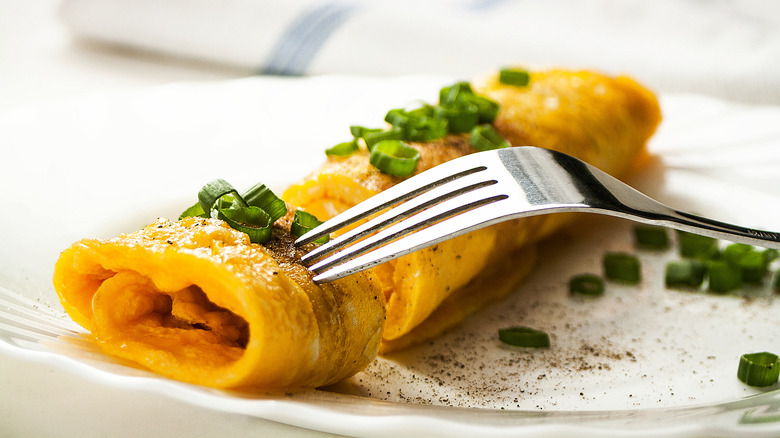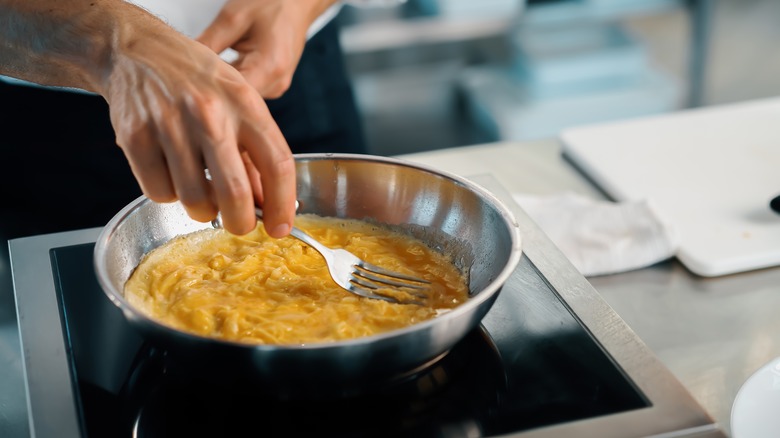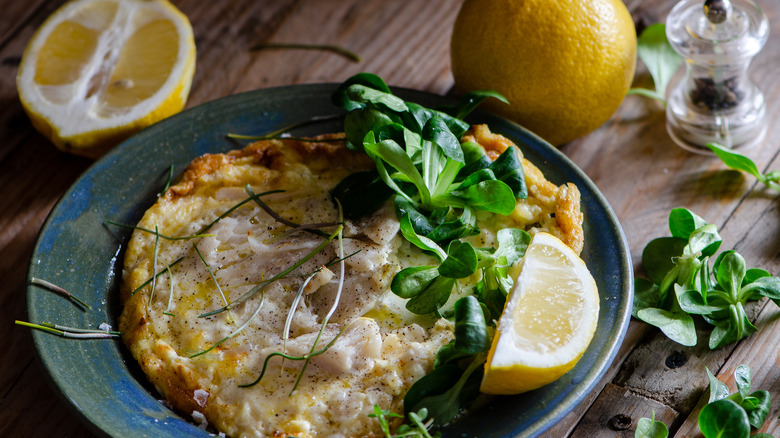Ever Wonder Why Omelet Has Two Different Spellings?
We may receive a commission on purchases made from links.
Whether they're kept simple, light, and fluffy, or loaded with gooey cheese and a variety of fillings, omelets never fail to make an enticing option for breakfast or brunch. But sometimes, you'll see omelet spelled 'omelette' on menus. So are they the same dish? And if so, why do they have different spellings?
Omelet is the spelling you'll see most commonly in American English while 'omelette' is the French spelling for the egg dish and is also more commonly used in British English. The term 'omelette' was officially originally used in the late 17th century in a French publication called Cuisine Bourgeoisie. 'Omelet' also dates back to the 17th century as a term, and became the preferred spelling that Americans chose to use. But the roots of the cooked egg dish itself go back much further than that, with many countries and cultures having their own version, from the ancient Japanese to the Romans, who cooked beaten eggs with honey on a flat clay dish.
French culinary bible "Larousse Gastronomique" claims that the French word 'omelette' comes from 'lamelle' (meaning thin strip, referring to its flatter shape), and has also previously been referred to as 'alumelle', 'alumette', and then 'amelette'. And the difference between French and American-style omelets extends beyond spelling and semantics; it's also about style.
An omelette is no omelet
As well as being spelled differently, French and American-style omelets are also prepared in quite different ways concerning ingredients, methods of cooking, and serving. And they're often intended as different meals, being more likely to be a dinner dish than served for brunch in France.
Just as French scrambled eggs differ in texture from American style, being much softer, silkier, and buttery with smaller curds, French omelettes also have a distinct texture. They're much softer, with the eggs lightly cooked until they're still gooey, unlike American omelets which have a firmer exterior and more color.
But unlike French scrambled eggs, which are cooked slowly over a low heat and take a long time, making a perfect French-style omelette is quicker to cook than an American omelet. That's partly down to it focusing on just a couple of ingredients (namely eggs and butter) when prepared in its simplest plain form, rather than a variety of different fillings, which take extra time. But it's also to do with the technique of shaking the pan rather than keeping it still, so it's lightly coated with an egg mixture, which is stirred with a fork. The delicately finished omelette is then served folded in three, like a roll, rather than a thicker American serving, often folded in half.
There are many variations of French-style omelette
Just as American omelets can be filled with an endlessly versatile array of ingredients, French-style omelettes also feature an impressive number of variations beyond the standard simple version. Classic recipes for French filled styles in "Larousse Gastronomique" include chicken livers with a Madeira demi-glace, and omelette Argenteuil, which is filled with asparagus and served with a cream sauce.
The egg dish is not always served rolled, either. A garnished option, omelette Feydeaux, is mixed with mushroom duxelle and topped with a poached egg, Mornay sauce, and Parmesan, finished under the grill to brown. Slightly similar in style is the British omelette Arnold Bennett, named after the 20th-century novelist, which is made with a rich, creamy béchamel (one of the classic French mother sauces) along with smoked haddock, and umami Parmesan cheese that melts under a hot grill.
As well as savory variations, French-style omelettes can also be sweet and served as a dessert. Omelette à la dijonnaise is made with crushed macaroons, heavy cream, custard, and ground almonds, and served with blackcurrant jelly. Whereas a soufflé omelette sees the egg whites beaten separately before being folded into the yolks, sugar, and citrus zest. It's cooked in the oven to puff up and can incorporate a range of flavors from chocolate or coffee to a strong liqueur. Eggs have never been so elegant.



